The Law Graduates’ Association of Nigeria (LAWGAN) has formally announced its establishment, with a mission to unite law graduates at home and abroad, champion their welfare, and drive reforms in Nigeria’s legal education system.
Headquartered in Ibadan, Oyo State, the association represents both graduates already called to the Nigerian Bar and those awaiting their Call to Bar. Its objectives include building partnerships with law firms to create internship and employment opportunities, tackling academic backlogs, and advocating for improved facilities and support across law faculties and the Nigerian Law School.
In a press statement, LAWGAN highlighted key challenges confronting law students and graduates, such as dilapidated infrastructure, delays in the release of results, high tuition fees, and poor security on campuses. The group particularly condemned the water scarcity crisis at the Port Harcourt Law School campus, demanding immediate provision of basic amenities despite the high fees paid by students.
The association called on the National Universities Commission (NUC), the Council of Legal Education (CLE), and Nigerian Law School authorities to address infrastructural deficits, while also urging a review of tuition fees in line with current economic realities. To ease pressure on the overstretched system, LAWGAN proposed the creation of more law faculties and additional law school campuses, adopting a decentralised model similar to international standards.
It also condemned the recent abduction of six students traveling to the Yola Law School campus, calling for stronger security measures across all educational institutions.
Beyond reforms, LAWGAN announced the creation of a Free Legal Services Committee to provide pro bono legal support, as well as plans to establish a law library for its members. The group also extended its advocacy to broader societal issues, urging government protection of human rights and justice, while calling for prompt ambassadorial appointments to safeguard Nigerians abroad.
President Kayode Bello expressed optimism about collaborating with the Nigerian Law School, the Nigerian Bar Association, the Body of Benchers, and the media to achieve these reforms.
“Law graduates trained in conducive environments will positively impact the legal profession and society at large,” Bello stated.





